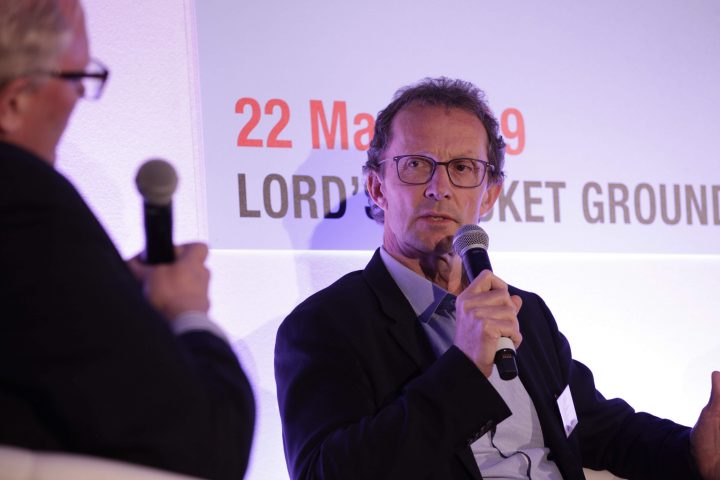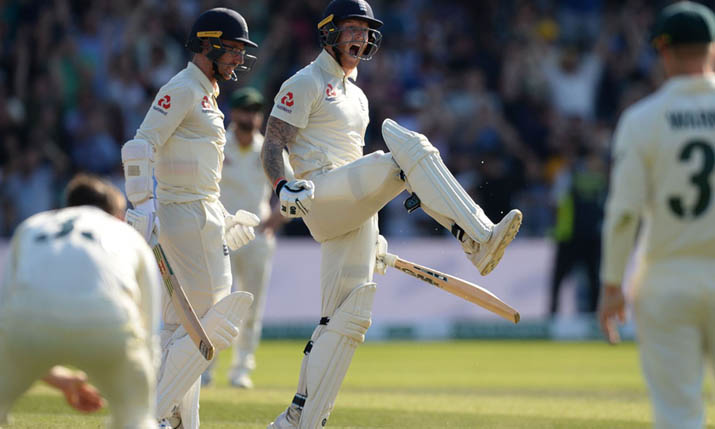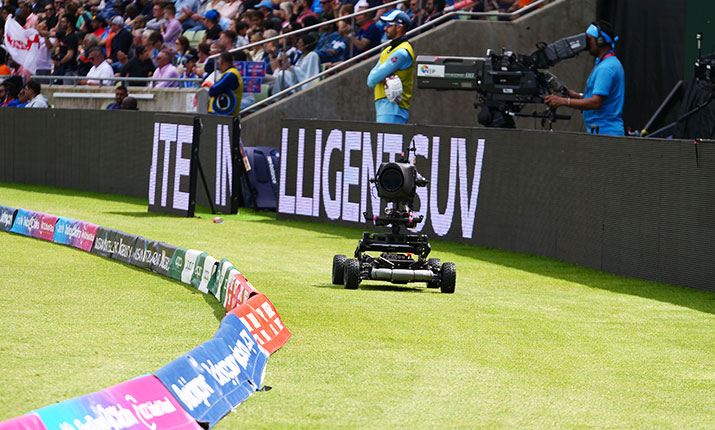From tea boy to chairman: Jeff Foulser on pushing on and never being satisfied

Sunset+Vine chairman Jeff Foulser chats with Fergal Ringrose during SVG Europe’s SportTech 2019 event at Lord’s Cricket Ground on 22 May
Sunset+Vine chairman Jeff Foulser has enjoyed a long and illustrious career that began as a young whippersnapper at the age of 18 with a chance game of cricket at London Weekend Television (LWT) and is still going strong at the company he has helped grow from five people to an international sports host broadcaster.
After playing a lot of cricket as a youngster, to the point where he even considered taking it up professionally, Foulser decided instead he, “probably ought to get a proper job, but I completely failed in that regard; I got into television!”.
“In those days there were only two places to work if you lived in London; one was LWT and the other was the BBC. I wrote to the BBC and they said come back when you’ve got a degree, but I wasn’t keen on going to uni; I did my A-Levels and stuff but I wanted to get out into the world. I managed to get a job at LWT basically as a tea boy; I was called a junior clerk,” he says.
Foulser continues: “I was given my first job by Jimmy Hill who was Head of Sport at LWT then. He was a former footballer and manager of Coventry City. He was a really smart guy who, when he was still a professional footballer, was responsible for ending the minimum wage in football. He also advocated three points for a win and was instrumental in many changes to the game. He obviously must have seen something in this 18 year old that he quite liked and he gave me the job, so I owe him everything really.”
Progressing up the ranks
On how he progressed up the ranks from tea boy, Foulser says, “I just got my nose in where it was important, really”. He goes on: “It would never happen these days, but on my first day at work I was called in by a wonderful man called John Bromley, who was the executive producer for sport at LWT, and he said, ‘ah, Jeffrey, you play a bit of cricket don’t you?’, so I said, ‘yes, I do sir’, so he said, ‘right, you’re playing tomorrow for World of Sport against Bagshot Cricket Club,’. So I got home that night and my mum asked, ‘how was your first day at work?’ and I said, ‘great, I’m playing cricket tomorrow!’. She couldn’t believe it. Anyway, within one day of joining, that night in the bar after the cricket I was one of the team already, and it was quite remarkable how quickly it happened from there.”
Foulser began getting involved in the production side of sports broadcast, gaining experience on outside broadcasts and logging football matches for editing. “I was the tea boy for about six months,” he remembers. “It was a fantastically vibrant sports department; a lot of really clever people, and you couldn’t fail to learn. My mentors were Jimmy Hill and John Bromley, Brian Moore the commentator, who was fantastic, and a guy called Bob Gardam who was a pioneering OB director who transformed football coverage in the late 60s, early 70s, and he was terrific. He put his arm round me and showed me how it was all done, really. So I had some brilliant people to learn from.”
“My view is if you try and stay where you are, you go backwards and I really do believe that. You have to push on and push on and never be satisfied.”
Other alumni from LWT during that period included, says Foulser, Mark Sharman who became head of Channel 4 sport, Robert Charles who became head of Channel 5 sport, Richard Worth who ran Team Marketing, Andrew Franklin who ran Channel 4 racing for many years, Tony Mills who became Sky’s leading football director, as well as talented on-screen performers like Jim Rosenthal and Martin Tyler. Foulser adds: “It was quite a hotbed. Looking back on it, I don’t think we realised it at the time, but there were some pretty good people there!”
At the tender age of 24, Foulser scored the job of producer of The Big Match, LWT’s flagship football programme. He comments on taking on such a large role at such a young age: “It is a little bit hard to believe. I’m not sure it would happen now; I think there’s probably more competition for a start. There’s a lot of really talented people around now. In those days there wasn’t a lot of football on television, so it was a programme with eight million to 10 million people watching it on a regular basis. So to be in charge of that was pretty amazing. When you’re young you don’t think about it in the way you do when you look back.”
Time to move on

England’s Ben Stokes pumped up and passionate after his exhilarating innings at Headingley during 2019 Ashes series against Australia
As well as leading the football charge at LWT, Foulser produced the Seoul Olympics in 1988 for the channel. However, the time came when Foulser felt it was time to move on.
He explains why: “I needed to do something different. I needed to test myself. I’d been part of this family at ITV and it was all a bit comfortable and I also didn’t want to work on football solely, which in the end [at ITV] I did; I became the executive producer of ITV football and when football started to take off, ITV bought the rights to what was then the First Division, but then became the Premier League, and we had 21 live games a season and I was in charge of that. It was pretty high profile; big audiences.
“I remember my last game when I knew I was leaving but I hadn’t told anybody else in ‘89, when Arsenal beat Liverpool at Anfield to win the title – the last game of the season and they needed to win 2-0 and they did it with the last kick of the game – and afterwards I told Brian Moore that I was leaving, and he said, ‘Jeff, how can you? Why would you want to leave after a night like that?’ and I said, ‘isn’t that the best time to leave?’.
Foulser had been approached by a company he had not previously heard of; Sunset+Vine. The independent production company had a contract with the Gillette company to make a weekly multi-sport magazine programme called Gillette World Sport, “quite a pioneering show and the first branded sports show on TV”, he notes.
He comments that the move to Sunset+Vine was not plain sailing, however: “I just felt I needed to test myself, and I regretted it for quite a while, because when I was at ITV, before computers and mobile phones took off in a big way, I was used to the phone going off all the time. I started on my first day at Sunset+Vine and sat there with just a desk and a phone and after about two hours nobody rang, so I thought I’m going to have to make things happen myself. Which was great really; it was a test.”
At that time for a number of reasons the company was not performing well, according to Foulser. He had therefore agreed to go back to ITV Sport with Ian Ritchie, who was then running London News Network, and between them take over ITV Sport. However, in the meantime, Sunset+Vine was taken over by the Molinare Group of companies in 1995, which created The Television Corporation from the merged firms.
Foulser was taken out to lunch by the guy that ran Molinare, Barry Firmin, who asked him what was wrong with the company. Firmin said that if he could make the changes Foulser recommended would he stay and run the business, which he did. Ritchie went on to become chief executive of the Rugby Football Union and the All England Lawn Tennis Club.
Stabilising the business
In January 1996 Foulser began his new role as managing director at Sunset+Vine with five people and one contract, for Gillette World Sport, which they managed to renewed shortly afterwards, stabilising the company’s situation.
The business was based in, “this ridiculous building in Mayfair, on a 25-year lease signed in 1989 which was costing £400,000 a year just for the rent and rates, before you’d bought a paperclip,” Foulser reminisces. “It was really precarious for a while.”
Channel 5 was starting up at that time so Sunset+Vine put in a bid to do a late-night sports show for six days per week, five hours per night, “full of weird and wonderful stuff, called Live and Dangerous,” says Foulser, although he adds, “well, it was live, but I don’t know how dangerous it was”.
The company won the contract and promptly employed 30 people to make the show. From that original crowd of youngsters, many have gone onto great things, including Stephen Cook who heads up IMG’s content, Titus Hill runs Sunset+Vine’s rugby for BT Sport, and Dylan Jane who runs Premier League Productions. That group became the foundation for the company, which then continued to grow, picking up Channel 5’s international live football coverage and Channel 4’s cricket contract in 1999, which it took from under the nose of IMG, Foulser says.
On the latter win, Foulser says: “That transformed the picture of Sunset+Vine as a business and a production entity. We introduced the Snickometer, the Red Zone, Hawkeye and the Analyst; we invested in the development of Hawkeye and really raised the bar for cricket coverage around the world picking up a number of awards including four Bafta’s.”
In 2003 Sunset+Vine won the BBC horseracing contract, a treasured prize at the time, eventually becoming the first independent production company to produce the Grand National. Foulser became chief executive of Sunset+Vine’s parent company, The Television Corporation, in 2003 then when the company was taken over in turn by Tinopolis in 2006 he became executive chair of Sunset+Vine.
Host broadcasting dreams

Buggy Cam in action at the Cricket World Cup earlier this year
“The next thing I’d always wanted to get into was being the host broadcaster at big events,” says Foulser. “We tried and failed a few times. Then the 2014 Commonwealth Games contract came up and we were approached by a company called Global Television in Australia, who have since become part of the NEP group. They provided a lot of the technical facilities at the IBC for the Melbourne and Delhi Commonwealth Games and they suggested we make a joint bid for the 2014 Games in Glasgow.”
The companies created a joint venture to pitch for the Games, and won, surprising some of the competition, Foulser notes: “That transformed the business in a different way because it took us into an area that had been a pretty exclusive club with just a few companies ruling the roost, and we upset them because they didn’t like someone else encroaching on what they thought was their territory. But you know, nothing’s exclusive, is it?”
Another transformative win was the contract for the 2012 Paralympics for Channel 4, for which Sunset+Vine, along with partner IMG, won a Bafta. Then in 2013 Sunset+Vine won the biggest independent sports contract in UK history when BT Sport went on air. Initially, the contract included the Premier League, the FA Cup, the Scottish Professional Football League and all BT Sport’s rugby coverage. Sunset+Vine had to double its staff numbers to cover the BT Sport contract, employing 60 people over a four-month period. The contract is now into its seventh year and is Sunset+Vine’s biggest and most important piece of business.
Comments Foulser: “That was completely transformative for this business. As a group we had to upgrade everything; all our systems – finance, IT, legal, accounting, everything – because BT Sport is an amazing big company and was demanding in terms of what we had to deliver. It actually transformed the whole Tinopolis Group in many ways.”
He adds: “Host broadcasting has been fantastic for us and we’d like to do more. We did the World Athletics Championships in London in 2017 and I think we did a really good job, and the World Equestrian Games last year in North Carolina, which was probably as difficult a project as we’ve ever undertaken, but it was incredible. We’ve picked up a lot of varied events and I think we can turn our hand to just about anything now. We covered the INEOS Challenge this October, where Eliud Kipchoge broke the two-hour barrier for the marathon. Again, that was a fantastic experience to be involved with. We’re picking up lots of good stuff and we need to; we’re a big company now!”
Keeping the beast fed
Says Foulser: “For any indie, you get to a point where you have to decide if you’re going to stay as you are and be nice and comfortable, and have a decent work-life balance and all those things, but then you win something and there’s no going back because you’re then on a path of constantly feeding the beast you’ve created, and you get into this mentality of needing to keep growing. And also your shareholders demand it!”
“My view is if you try and stay where you are you go backwards and I really do believe that. You have to push on and push on and never be satisfied. It annoys me sometimes because I think inherently I’m quite lazy – I like the idea of not doing very much – but deep down I know I couldn’t live like that,” he says.
Foulser continues: “I never really had a plan for Sunset+Vine to be where it is now. Some people say they had this 10-year vision and they got there, but it wasn’t like that for us; we just kept picking things up and going for new and different types of business. We got knock backs and bruising losses along the way and I just thought, ‘sod that’, dust yourself off and go for the next one. That’s all you can really do.”
The future is about more growth, Foulser states. “We’ve got plans to grow the company more internationally. Whether we can do that totally on our own is debatable because it is quite hard to break into certain markets but we’ve got a good name internationally now. ITT’s for big events just drop into our mailbox now that never would have 10 years ago.”
Still about storytelling
On how he has seen sports broadcasting change over the course of his career, Foulser says: “I think it’s quite interesting in that editorially and creatively it hasn’t really changed at all. It’s still about storytelling, it’s about bringing things to an audience that maybe they wouldn’t have thought of or seen themselves, it’s about entertaining and it’s about informing, and that’s always been the case and I don’t think the journalism of that will ever change.
“What has changed massively though is the proliferation of channels, the amount of sport that is out there and how you make yourself stand out from the crowd,” he continues. “The reason sport is so valuable to broadcasters is it delivers fantastic numbers; look at the Rugby World Cup on ITV, or the Cricket World Cup Final (a Sunset+Vine Production for ICC TV by the way,) which on Channel 4 and Sky Sports got 8.3 million viewers, and the FIFA World Cup which was just off the charts. Sport does that more than any other genre; real-life drama.
“The other thing that’s changed is technology; that’s completely different now compared to the ‘70s when I started. If you look at the quality of sports production now all over the world, it’s phenomenal and I think the quality in the UK is right up there with anything elsewhere. If you look at what Sky achieved in the ‘90s and early 2000s, if you look at what BT Sport did to get themselves going so quickly from a standing start, I think they did an incredible job.
“The BBC still has a role to play in terms of delivering big audiences across all its platforms, Channel 4 has always been the maverick with the Paralympics and now moving into more mainstream sport, and Channel 5 has been a real player since they started in the late 90s; it’s a fantastically vibrant market in the UK and we love being part of it.”

